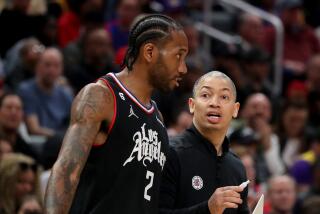Iran-Contra Trial Remarks Spur Warning of Contempt : Inquiry: Former CIA spy chief George apologizes for outbursts during cross-examination. He explains that his life has been ‘hell’ this year.
- Share via
WASHINGTON — A federal judge, rapping his gavel and ordering the jury from the courtroom, threatened to hold former CIA spy chief Clair E. George in contempt Friday for repeatedly interrupting the prosecutor during a grueling cross-examination.
George, on trial for perjury, false statements and obstruction of Iran-Contra inquiries, immediately apologized, saying later that the year had been “hell” for him.
His lawyer, Richard A. Hibey, told U.S. District Judge Royce C. Lamberth: “This does not help him before the jury. We all know that.” The expressions on jurors’ faces, ranging from impassive to scowling during some of George’s outbursts, seemed to confirm Hibey’s assertion. “I would have hoped that you would have talked to your client about summary contempt proceedings,” the judge told Hibey. “Do you want me to tell him, or will you tell him how to comply with an order of this court?”
Saying he was “sorry we have incurred the court’s wrath,” Hibey added: “This is a highly stressful situation, and he has responded naturally to it. This is not a contrived effort.”
During Thursday’s six hours of cross-examination, George responded to questions that required only yes or no answers by instead claiming to be the victim of hypocritical members of Congress who he said already knew about secret efforts to supply the Contras when they questioned him.
He also accused chief prosecutor Craig A. Gillen of deceiving him into believing he was only a witness in the investigation.
As George finished nearly three days of questioning, Lamberth pointed out to jurors that the defendant had the “very difficult” task of responding to questions without disclosing classified material.
Lamberth observed that “you were our nation’s No. 1 spy,” and George agreed with him that he was ultimately responsible for conducting 35 to 45 other covert operations overseas while Iran-Contra took place.
George has suggested that he was too engaged in other matters to have directed a cover-up of CIA involvement in Iran-Contra--an allegation made by the prosecution’s chief witness, Alan D. Fiers, former chief of the CIA’s Central American task force.
George reacted heatedly when Gillen questioned him about Fiers’ testimony that he had suggested to George that funds from the sale of arms to Iran were being diverted to support the Contras.
“If there is any single issue in this entire trial that I deny, it is Mr. Fiers’ claim to have come to me and told me about the diversion,” George said. “That is absolutely, positively untrue.”
But he also recounted a Nov. 20, 1986, meeting in the office of former CIA Director William J. Casey in which the subject of diversion came up--five days before it was made public by then-Atty. Gen. Edwin Meese III.
George said that “someone” during the meeting said: “ ‘But, Bill, (referring to Casey) there are stories that money from the arms sale to Iran has been given to the Contras.’
“Mr. Casey very quickly said, ‘I know nothing about that,’ ” George said, adding that “I had never heard such a thing.”
George also took exception to Gillen’s suggestion that he had tried to protect retired Air Force Major Gen. Richard V. Secord during Dec. 3, 1986, congressional testimony by saying he had “never laid eyes on him.”
Secord had roles in both the arms sales to Iran and the Contra resupply scheme, and George later acknowledged they had met in the White House situation room in January, 1986. The earlier denial is a part of the indictment.
“I would never protect Mr. Secord,” said George, who in other testimony told of opposing Secord’s participation in the arms sale operation on “character” grounds.
“The first person you were trying to protect was Clair George, isn’t that correct?” Gillen asked.
“Mr. Gillen, you want to know something you don’t? Throughout that period, I was trying to protect the Central Intelligence Agency,” George said. “It may not be understandable to you, but that’s what I was doing.”
Later, George described his testimony before the Senate panel for which he has been charged with perjury as “full of errors, but none of them deliberate.”
At the time, he said he “was sick and worried” and about to enter the hospital for a kidney stone operation. “The agency was in chaos. The director (Casey) dying. The deputy director (Robert M. Gates) was catching up.”
In addition, the committee had directed him to appear without any of the specialists from the agency that usually accompanied him, and without an agency lawyer, though he could have brought a personal lawyer if he had wanted, George noted.
In excusing the jury for the weekend, Lamberth said he expected them to begin deliberations as early as Thursday, after testimony by CIA Director Gates.
More to Read
Sign up for Essential California
The most important California stories and recommendations in your inbox every morning.
You may occasionally receive promotional content from the Los Angeles Times.













